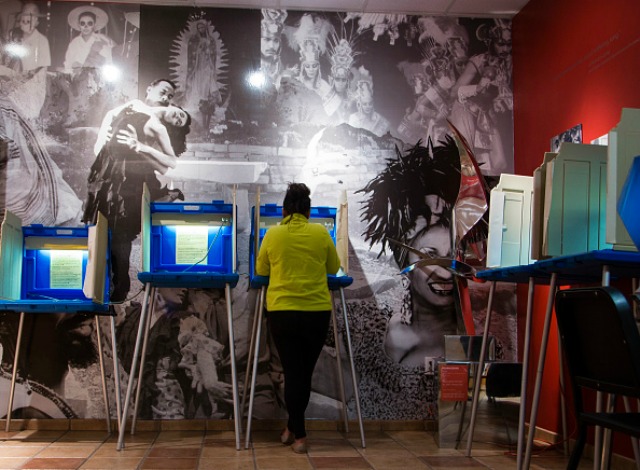Don't Be Afraid To Talk About Voter Suppression
By Stephen Gossett in News on Nov 11, 2016 6:20PM

Getty Images / Photo: Darren Hauck
Massive waves of anti-Trump protesters have taken to the streets in cities across America in the wake of Tuesday’s surprise (to most) election results. Thousands marched right here in Chicago on Wednesday, flooding the Loop and Lake Shore Drive. Chants of “Not my president” and “We reject the president” are a common refrain. Meanwhile, a widely circulated petition calling for the Electoral College to vote instead for Hillary Clinton, who won the popular vote, on Dec. 19 has gathered millions of supporters. Some Trump supporters view all this as anti-democratic, the very kind of “rigged system” that they preemptively described before the election.
The grey shades of protest cries do not equate to a systematic rejection, we’d argue, but we can play ball; and the popular-vote-as-mandate argument isn’t airtight, however understandable. But one liberal “complaint” must absolutely not be allowed to be cast as sour grapes: voter suppression.
Trump won Wisconsin by 27,000 votes. For perspective, 300,000 registered voters in WI lacked strict voter ID https://t.co/zVbojQvh2E pic.twitter.com/AFtNjI5Ima
— Ari Berman (@AriBerman) November 9, 2016
Those startling examples come from Ari Berman, who has been covering voter suppression extensively for The Nation, including our immediate neighbors to the north, Wisconsin.
This was the first presidential election in five decades without the Voting Rights Act, Berman noted. But Wisconsin’s state Voter ID law appears to have had distinct disenfranchising effects. Although some of the lower-than-usual turnout mentioned above by Berman owes to an enthusiasm gap, Neil Albrecht, executive director of the city's Election Commission, saw several red flags.
The Milwaukee Journal Sentinel writes:
“(Albrecht) said that four districts of the city with the most "transient, high poverty" residents experienced trouble with people struggling to meet the photo identification requirement. Previously, those voters were able to have "corroborating witnesses" vouch for them at the polls.
Andrea Kaminski, of League of Women Voters, told the paper she saw voters turned away without being given provisional ballots. “We definitely saw real people leaving. They were not offered a provision ballot and they should be,” she said. “Probably it was happening a lot more than we saw.”
A federal judge in October criticized state officials for not properly explaining to citizen’s the law’s requirements, although “he said he did not think he had the authority to suspend the law,” according to CNN.
The problem, however, was far more widespread than just Wisconsin, Berman notes:
"On Election Day, there were 868 fewer polling places in states with a long history of voting discrimination, like Arizona, Texas, and North Carolina. These changes impacted hundreds of thousands of voters, yet received almost no coverage. In North Carolina, as my colleague Joan Walsh reported, black turnout decreased 16 percent during the first week of early voting because “in 40 heavily black counties, there were 158 fewer early polling places.Even if these restrictions had no outcome on the election, it’s fundamentally immoral to keep people from voting in a democracy."
That final point remains instructive. It will take some time to fully comprehend the degree to which voter suppression persisted on Tuesday. Asking that vital question should not be painted as tantamount to sore losing.